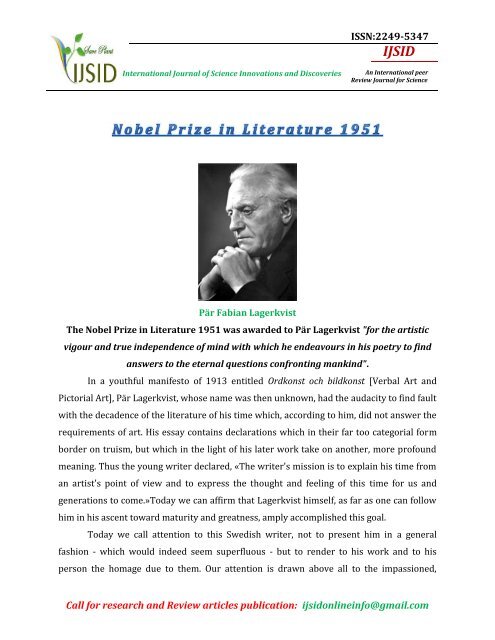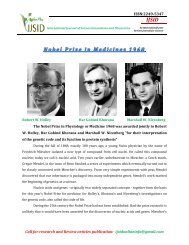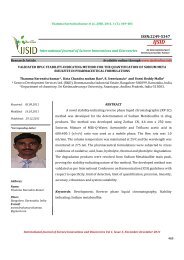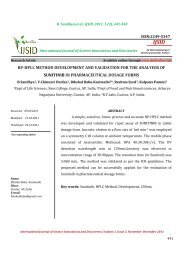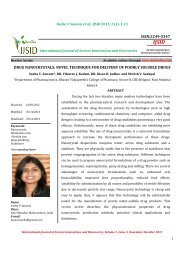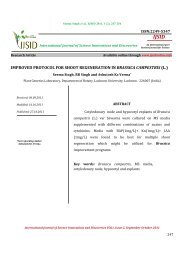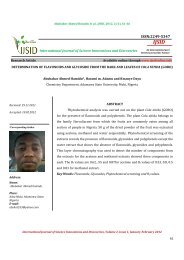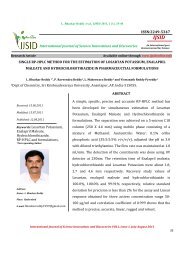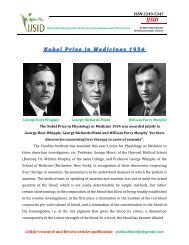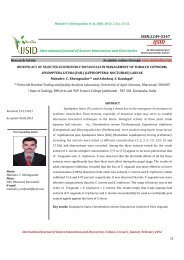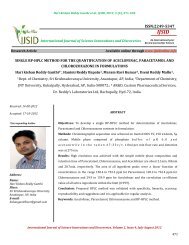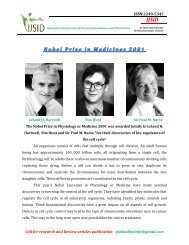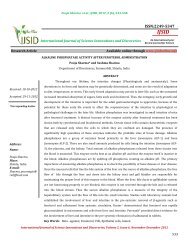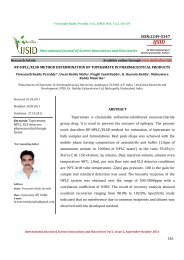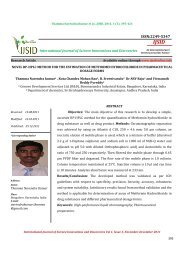The Nobel Prize in Literature 1951 was awarded to ... - Ijsidonline.info
The Nobel Prize in Literature 1951 was awarded to ... - Ijsidonline.info
The Nobel Prize in Literature 1951 was awarded to ... - Ijsidonline.info
You also want an ePaper? Increase the reach of your titles
YUMPU automatically turns print PDFs into web optimized ePapers that Google loves.
ISSN:2249-5347IJSIDInternational Journal of Science Innovations and DiscoveriesAn International peerReview Journal for SciencePär Fabian Lagerkvist<strong>The</strong> <strong>Nobel</strong> <strong>Prize</strong> <strong>in</strong> <strong>Literature</strong> <strong>1951</strong> <strong>was</strong> <strong>awarded</strong> <strong>to</strong> Pär Lagerkvist "for the artisticvigour and true <strong>in</strong>dependence of m<strong>in</strong>d with which he endeavours <strong>in</strong> his poetry <strong>to</strong> f<strong>in</strong>danswers <strong>to</strong> the eternal questions confront<strong>in</strong>g mank<strong>in</strong>d".In a youthful manifes<strong>to</strong> of 1913 entitled Ordkonst och bildkonst [Verbal Art andPic<strong>to</strong>rial Art], Pär Lagerkvist, whose name <strong>was</strong> then unknown, had the audacity <strong>to</strong> f<strong>in</strong>d faultwith the decadence of the literature of his time which, accord<strong>in</strong>g <strong>to</strong> him, did not answer therequirements of art. His essay conta<strong>in</strong>s declarations which <strong>in</strong> their far <strong>to</strong>o categorial formborder on truism, but which <strong>in</strong> the light of his later work take on another, more profoundmean<strong>in</strong>g. Thus the young writer declared, «<strong>The</strong> writer's mission is <strong>to</strong> expla<strong>in</strong> his time froman artist's po<strong>in</strong>t of view and <strong>to</strong> express the thought and feel<strong>in</strong>g of this time for us andgenerations <strong>to</strong> come.»Today we can affirm that Lagerkvist himself, as far as one can followhim <strong>in</strong> his ascent <strong>to</strong>ward maturity and greatness, amply accomplished this goal.Today we call attention <strong>to</strong> this Swedish writer, not <strong>to</strong> present him <strong>in</strong> a generalfashion - which would <strong>in</strong>deed seem superfluous - but <strong>to</strong> render <strong>to</strong> his work and <strong>to</strong> hisperson the homage due <strong>to</strong> them. Our attention is drawn above all <strong>to</strong> the impassioned,Call for research and Review articles publication: ijsidonl<strong>in</strong>e<strong>in</strong>fo@gmail.com
ISSN:2249-5347IJSIDInternational Journal of Science Innovations and DiscoveriesAn International peerReview Journal for Scienceunfalter<strong>in</strong>g s<strong>in</strong>cerity, the ardent, unweary<strong>in</strong>g patience, that have been the liv<strong>in</strong>g forcesbeh<strong>in</strong>d his work. By these purely spiritual qualities, Pär Lagerkvist should answer fairlywell, at least as a type of creative m<strong>in</strong>d, <strong>to</strong> what <strong>Nobel</strong> said <strong>in</strong> the Sibyll<strong>in</strong>e terms of his will:«<strong>in</strong> an idealistic sense». Undeniably he belongs <strong>to</strong> that group of writers who, boldly anddirectly, have dedicated themselves <strong>to</strong> the vital questions of humanity, and who havetirelessly returned <strong>to</strong> the fundamental problems of our existence, with all that isoverwhelm<strong>in</strong>g and sorrowful. <strong>The</strong> era <strong>in</strong> which he lived, whose materials determ<strong>in</strong>ed hisvocation, <strong>was</strong> menaced by ris<strong>in</strong>g clouds and by the eruptions of catastrophes. It is on thissombre and chaotic scene that he began <strong>to</strong> fight; it is <strong>in</strong> this country without sun that hediscovered the flame of his <strong>in</strong>spiration.Lagerkvist, with a precocious <strong>in</strong>st<strong>in</strong>ct of the imag<strong>in</strong>ation, apprehended theapproach<strong>in</strong>g disaster so far <strong>in</strong> advance that he <strong>was</strong> the prophet of anguish <strong>in</strong> Nordicliterature; but he is also one of the most vigilant guardians of the spirit's sacred fire whichthreatens <strong>to</strong> be ext<strong>in</strong>guished <strong>in</strong> the s<strong>to</strong>rm. A number of those listen<strong>in</strong>g <strong>to</strong> me surely recallthe short s<strong>to</strong>ry <strong>in</strong> Lagerkvist's Onda Sagor (1924) [Evil Tales], <strong>in</strong> which one sees the child often, on a lum<strong>in</strong>ous spr<strong>in</strong>g day, walk<strong>in</strong>g with his father along the railroad track; they hear<strong>to</strong>gether the songs of the birds <strong>in</strong> the forest, and then, on their way back, <strong>in</strong> the dusk, theyare suddenly surprised by the unknown noise which cleaves the air. «I had an obscureforebod<strong>in</strong>g of what that meant; it <strong>was</strong> the anguish which <strong>was</strong> go<strong>in</strong>g <strong>to</strong> come, all theunknown, which Father did not know, and from which he could not protect me. Here iswhat this world will be, what this life will be for me, not like Father's life <strong>in</strong> whicheveryth<strong>in</strong>g <strong>was</strong> reassur<strong>in</strong>g and well established. It <strong>was</strong> not a real world, not a real life. It<strong>was</strong> only someth<strong>in</strong>g ablaze which rushed <strong>in</strong><strong>to</strong> the depths of obscurity, obscurity withoutend.» This childhood memory now appears <strong>to</strong> us as a symbol of the theme that dom<strong>in</strong>atesPär Lagerkvist's work; at the same time, one might say that it proves <strong>to</strong> us that hissubsequent works are authentic and logically necessary.It is impossible, with the short time at our disposal <strong>to</strong>day, <strong>to</strong> exam<strong>in</strong>e all theseworks <strong>in</strong> turn. <strong>The</strong> important th<strong>in</strong>g is that, while Pär Lagerkvist makes use of differentCall for research and Review articles publication: ijsidonl<strong>in</strong>e<strong>in</strong>fo@gmail.com
ISSN:2249-5347IJSIDInternational Journal of Science Innovations and DiscoveriesAn International peerReview Journal for Sciencegenres, dramatic or lyric, epic or satiric, his way of grasp<strong>in</strong>g reality rema<strong>in</strong>s fundamentallythe same. It does not matter <strong>in</strong> his case if the results are not always on a level with the<strong>in</strong>tentions, for each work plays the role of a s<strong>to</strong>ne <strong>in</strong> an edifice he <strong>in</strong>tends <strong>to</strong> build; each is apart of his mission, a mission that always bears on the same subject: the misery andgrandeur of what is human, the slavery <strong>to</strong> which earthly life condemns us, and the heroicstruggle of the spirit for its liberation. This is the theme <strong>in</strong> all the works we choose <strong>to</strong> recallat this time: Gäst hos verkligheten (1925) [Guest of Reality]; Hjärtats sånger (1926) [Songsfrom the Heart]; Han som fick leva om sitt liv (1928) [He Who Lived His Life Over Aga<strong>in</strong>];Dvärgen (1944) [<strong>The</strong> Dwarfl]; Barabbas (1950). It is needless <strong>to</strong> cite others <strong>to</strong> give an ideaof the scope of Lagerkvist's <strong>in</strong>spirations and the power of his genius.One of the foreign experts who, on the fiftieth anniversary of the <strong>Nobel</strong> Foundation,criticized the his<strong>to</strong>ric series of <strong>Nobel</strong> <strong>Prize</strong> laureates, gave as criteria two conditions whichseemed equally <strong>in</strong>dispensable <strong>to</strong> him: on the one hand the artistic value of the f<strong>in</strong>ishedwork, on the other its <strong>in</strong>ternational reputation. Insofar as this last condition is concerned, itcan immediately be objected that those who write <strong>in</strong> a language that is not widespread willf<strong>in</strong>d themselves at a great disadvantage. In any case, it is extremely rare that a Nordicwriter could make a reputation with the <strong>in</strong>ternational public, and, therefore, a fairjudgment on this k<strong>in</strong>d of candidate is an especially delicate matter. However, <strong>Nobel</strong>'s willexplicitly prescribes that the <strong>Prize</strong>s should be <strong>awarded</strong> without any consideration ofnationality, so that they should be <strong>awarded</strong> <strong>to</strong> the worthiest, be he Scand<strong>in</strong>avian or not.»That should also signify that if a writer seems worthy of the <strong>Nobel</strong> <strong>Prize</strong>, the fact that he isSwedish, for example, should not <strong>in</strong> the end h<strong>in</strong>der him from obta<strong>in</strong><strong>in</strong>g it. As for PärLagerkvist, we must consider another fac<strong>to</strong>r, which pleases us very much: his last work hasattracted much sympathy and esteem outside our frontiers. This <strong>was</strong> further proved by the<strong>in</strong>sistent recommendations with which Lagerkvist's candidacy has been susta<strong>in</strong>ed by amajority of foreign advisers. He does not owe his <strong>Prize</strong> <strong>to</strong> the Academy circle itself. That themov<strong>in</strong>g <strong>in</strong>terpretations of the <strong>in</strong>ner conflicts of Barabbas have found such repercussionseven <strong>in</strong> foreign languages clearly shows the profoundly <strong>in</strong>spired character of this work,Call for research and Review articles publication: ijsidonl<strong>in</strong>e<strong>in</strong>fo@gmail.com
ISSN:2249-5347IJSIDInternational Journal of Science Innovations and DiscoveriesAn International peerReview Journal for Sciencewhich is all the more remarkable as the style of it is orig<strong>in</strong>al and <strong>in</strong> a sense untranslatable.Indeed, <strong>in</strong> this language at once harsh and sensitive, Lagerkvist's compatriots often hearthe echo of Småland folklore reecho<strong>in</strong>g under the starry vault of Biblical legend. Thisrem<strong>in</strong>ds us once more that regional <strong>in</strong>dividuality can sometimes be transformed <strong>in</strong><strong>to</strong>someth<strong>in</strong>g universal and accessible <strong>to</strong> all.On each page of Pär Lagerkvist's work are words and ideas which, <strong>in</strong> their profoundand fearful tenderness, carry at the very heart of their purity a message of terror. <strong>The</strong>irorig<strong>in</strong> is <strong>in</strong> a simple, rustic life, laborious and frugal of words. But these words, thesethoughts, handled by a master, have been placed at the service of other designs and havebeen given a greater purpose, that of rais<strong>in</strong>g <strong>to</strong> the level of art an <strong>in</strong>terpretation of the time,the world, and man's eternal condition. That is why <strong>in</strong> the statement of the reasons foraward<strong>in</strong>g the <strong>Nobel</strong> <strong>Prize</strong> <strong>to</strong> Pär Lagerkvist, it seems legitimate <strong>to</strong> us <strong>to</strong> affirm that thisnational literary production has risen <strong>to</strong> the European level.Dr. Lagerkvist - We who have followed you from close by know how repugnant it is<strong>to</strong> you <strong>to</strong> be placed <strong>in</strong> the limelight. But s<strong>in</strong>ce that seems <strong>in</strong>evitable at this moment, I begyou only <strong>to</strong> believe <strong>in</strong> the s<strong>in</strong>cerity of our congratulations at the moment when you receivethis award which, accord<strong>in</strong>g <strong>to</strong> us, you have deserved more than any other at the presenttime. I have been obliged <strong>to</strong> s<strong>in</strong>g your praises <strong>in</strong> front of you. But if the occasion were lesssolemn, I would be tempted <strong>to</strong> tell you quite simply, <strong>in</strong> the old Swedish manner: may itbr<strong>in</strong>g you happ<strong>in</strong>ess. And now, it rema<strong>in</strong>s for me <strong>to</strong> ask you <strong>to</strong> receive from the hands ofour K<strong>in</strong>g the <strong>Nobel</strong> <strong>Prize</strong> <strong>in</strong> <strong>Literature</strong> for <strong>1951</strong>.For more details please visit:http://www.nobelprize.org/nobel_prizes/literature/laureates/<strong>1951</strong>/press.htmlCall for research and Review articles publication: ijsidonl<strong>in</strong>e<strong>in</strong>fo@gmail.com


